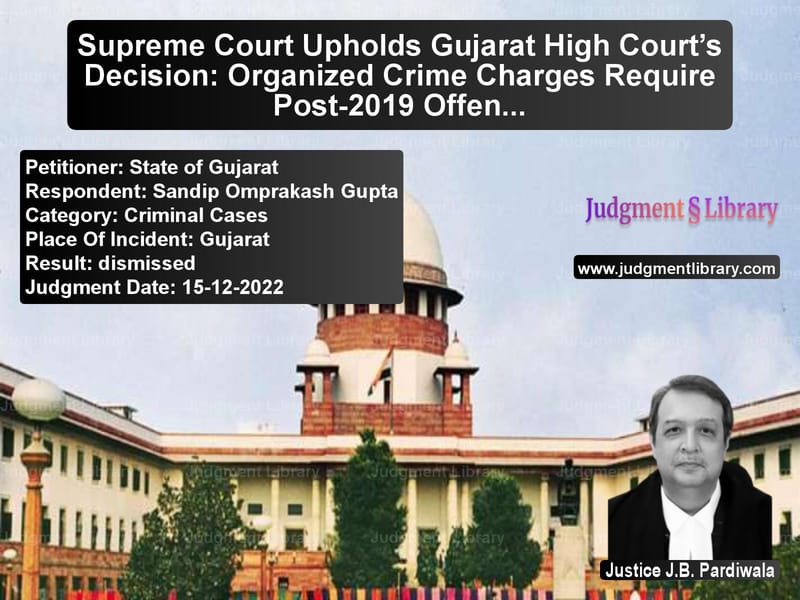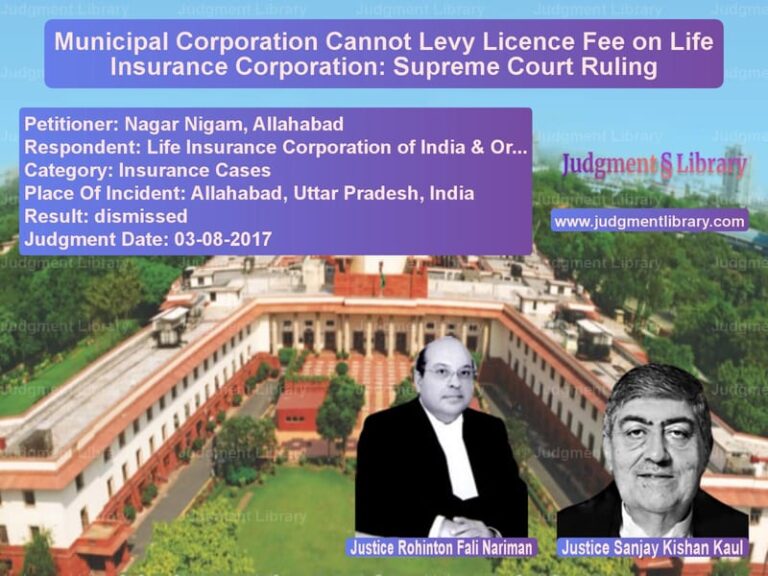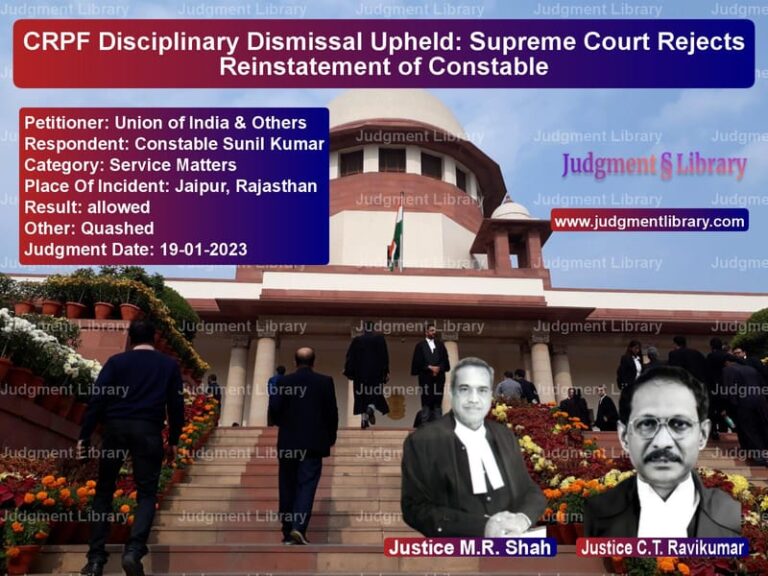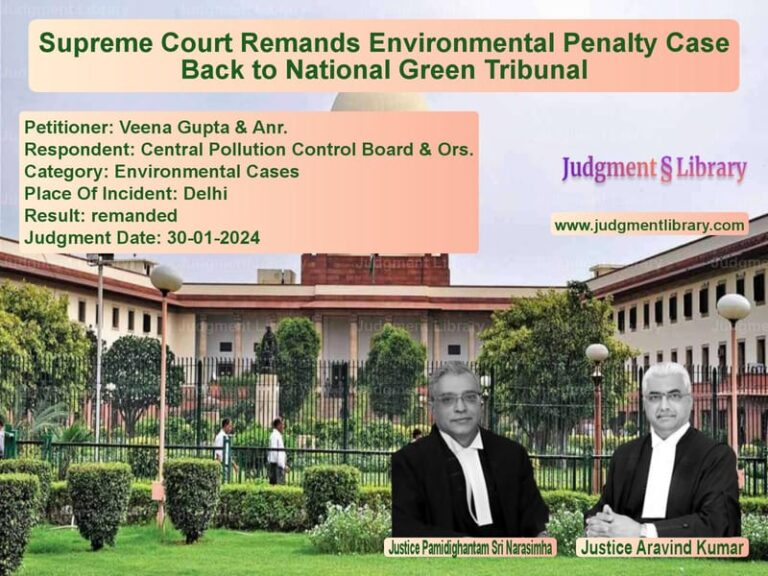Supreme Court Upholds Gujarat High Court’s Decision: Organized Crime Charges Require Post-2019 Offenses
The Supreme Court of India recently ruled in the case of State of Gujarat vs. Sandip Omprakash Gupta, addressing the legal requirements for charging individuals under the Gujarat Control of Terrorism and Organised Crime Act, 2015 (GCTOC Act). The Court upheld the Gujarat High Court’s decision, confirming that for an individual to be charged under the Act, there must be a continued unlawful activity post-enactment (i.e., after 01.12.2019).
The ruling is a significant clarification on the retrospective application of the Act and the requirement for fresh offenses post-promulgation.
Background of the Case
The dispute arose when the Gujarat police invoked the 2015 Act against Sandip Omprakash Gupta, alleging his involvement in organized crime based on multiple past criminal cases.
The key timeline of events was as follows:
- Prior to 2019: Several FIRs were registered against Sandip Gupta under the Indian Penal Code (IPC).
- 01.12.2019: The Gujarat Control of Terrorism and Organised Crime Act, 2015, came into force.
- 27.11.2020: A fresh FIR was filed under the 2015 Act.
- 06.05.2021: The Gujarat High Court granted bail, ruling that past FIRs alone cannot justify charges under the new Act.
- 15.12.2022: The Supreme Court upheld the High Court’s ruling.
Arguments by the Appellant (State of Gujarat)
The Solicitor General, representing the State, argued:
- The Gujarat High Court wrongly interpreted the law, as past FIRs should be considered for invoking the Act.
- The Act aims to curb organized crime, and restricting its application only to post-2019 offenses weakens its effectiveness.
- The phrase “continuing unlawful activity” in Section 2(1)(c) of the Act includes prior offenses.
- Delaying enforcement until multiple new FIRs are registered defeats the purpose of the Act.
Arguments by the Respondent (Sandip Omprakash Gupta)
The defense counsel countered:
- Applying the 2015 Act retrospectively violates Article 20(1) of the Constitution, which prohibits ex post facto laws.
- The last IPC case against the respondent was in 2019, and no fresh case had been registered under the Act post-2019.
- The Gujarat High Court correctly ruled that past criminal records do not constitute “continuing unlawful activity.”
- Charges under the Act must be based on offenses occurring after its enforcement date.
Supreme Court’s Judgment
The Supreme Court upheld the Gujarat High Court’s decision and ruled:
- The term “continuing unlawful activity” under Section 2(1)(c) requires at least one post-2019 offense.
- Past FIRs alone cannot justify invoking the 2015 Act.
- Applying the Act retroactively would violate constitutional protections under Article 20(1).
- The Court cited Shiva alias Shivaji Ramaji Sonawane vs. State of Maharashtra (2015), emphasizing that organized crime laws must not be applied retrospectively.
Key Precedents Cited
The Supreme Court relied on multiple landmark cases, including:
- Shiva alias Shivaji Ramaji Sonawane vs. State of Maharashtra (2015): Held that organized crime laws require fresh offenses post-enactment.
- State of Maharashtra vs. Bharat Shantilal Shah (2008): Established that “continuing unlawful activity” requires multiple FIRs but must include post-law offenses.
- Ranjitsing Brahmajeetsing Sharma vs. State of Maharashtra (2005): Clarified that preventive detention laws must be interpreted strictly.
Impact of the Judgment
This Supreme Court ruling has several major implications:
- Ensures constitutional protections: Prevents retrospective application of organized crime laws.
- Clarifies evidentiary standards: Prosecution under the 2015 Act requires at least one post-enactment offense.
- Prevents misuse of the Act: Ensures that individuals are not wrongfully charged based on old cases.
Conclusion
The Supreme Court’s ruling in State of Gujarat vs. Sandip Omprakash Gupta reinforces the principle that laws cannot be applied retroactively. The judgment ensures that charges under the Gujarat Control of Terrorism and Organised Crime Act, 2015, must be based on fresh offenses post-enactment.
The verdict sets an important precedent for future organized crime cases, ensuring that individuals are charged only in accordance with the law as it stands at the time of the offense.
Petitioner Name: State of Gujarat.Respondent Name: Sandip Omprakash Gupta.Judgment By: Justice J.B. Pardiwala.Place Of Incident: Gujarat.Judgment Date: 15-12-2022.
Don’t miss out on the full details! Download the complete judgment in PDF format below and gain valuable insights instantly!
Download Judgment: state-of-gujarat-vs-sandip-omprakash-gup-supreme-court-of-india-judgment-dated-15-12-2022.pdf
Directly Download Judgment: Directly download this Judgment
See all petitions in Terrorist Activities
See all petitions in Fraud and Forgery
See all petitions in Judgment by J.B. Pardiwala
See all petitions in dismissed
See all petitions in supreme court of India judgments December 2022
See all petitions in 2022 judgments
See all posts in Criminal Cases Category
See all allowed petitions in Criminal Cases Category
See all Dismissed petitions in Criminal Cases Category
See all partially allowed petitions in Criminal Cases Category







